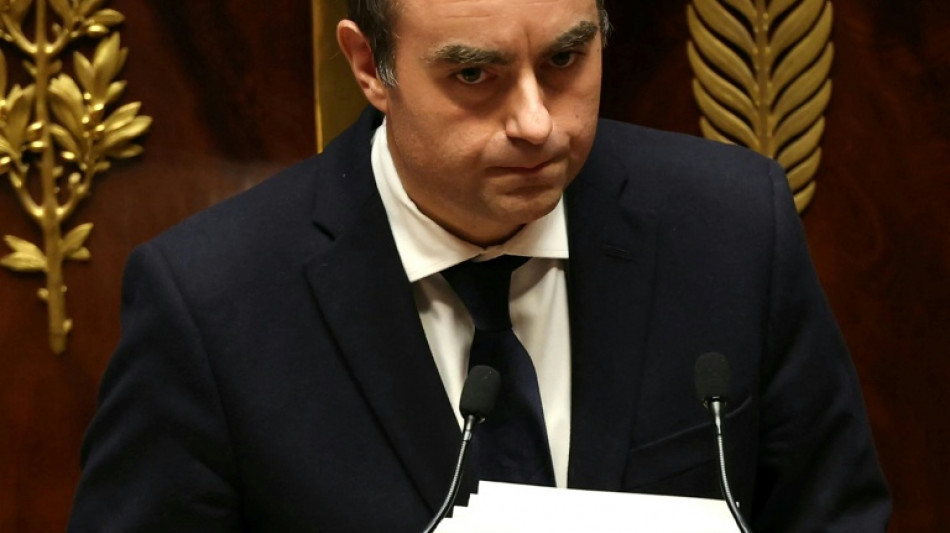

French PM backs suspending pensions reform to save government
France's Prime Minister Sebastien Lecornu on Tuesday backed the suspension of an unpopular 2023 pensions reform, in a key move to bolster his cabinet's survival and draw his country out of political crisis.
The eurozone's second-largest economy has been battling a deep political crisis since President Emmanuel Macron called snap elections last year that were intended to consolidate his power but instead resulted in a hung parliament and gains for the far right.
After parliament toppled his two predecessors over cost-cutting measures, Lecornu, the president's seventh premier since 2017, is battling to keep his cabinet alive long enough to pass a much-needed austerity budget by the end of the year.
One major sticking point for Lecornu was an unpopular 2023 pension reform that raised the retirement age from 62 to 64, with the Socialists -- a key swing vote in parliament -- threatening to topple the premier unless it was immediately put on hold.
During his policy speech Tuesday, Lecornu said he supported suspending the reform -- a move that could give the prime minister some breathing room from the immediate threat to his leadership.
"I will propose to parliament this autumn that we suspend the 2023 pension reform until the presidential election," Lecornu said.
"There will be no increase in the retirement age from now until January 2028."
The decision brought some relief for the embattled premier after the Socialists said they would not vote to oust him -- for now.
Socialist lawmaker Boris Vallaud called the move a "victory" for his party and said his group was ready to take a "gamble" to allow debates on the budget to proceed.
"We are capable of compromise," he said, before however adding a warning: "We are capable of bringing down a government."
The pension bill, which a previous government used a constitutional power to force through parliament without a vote, sparked months of angry protests.
Lecornu also promised he would not use the controversial tool to bypass a vote in parliament on any draft laws, and put all proposed bills to debate.
"The government will make suggestions, we will debate, and you will vote," the 39-year-old Macron loyalist repeated throughout his address.
- Below five percent -
The premier's speech follows a dramatic fortnight in French politics.
Lecornu, who became prime minister last month, resigned on Monday last week after criticism of his newly appointed government.
He was re-appointed on Friday and proposed a new team of ministers on Sunday -- just in time for the government to approve and file a draft budget with parliament.
In the draft approved by his government Tuesday, France's public deficit was cut to 4.7 percent of gross domestic product (GDP), Lecornu said, warning it must remain below five percent after parliamentary debate on the budget.
France's debt-to-GDP ratio is the European Union's third-highest after Greece and Italy, and is close to twice the 60-percent limit fixed by EU rules.
Freezing the pension reform would cost around 400 million euros ($463 million) in 2026 and 1.8 billion euros the following year, Lecornu said, adding that the shortfall should be covered by savings.
The former defence minister told lawmakers the move was not about "suspending for the sake of suspending," but an opportunity to chart a new course for the country's pension system.
- 'Fear the ballot box' -
Lecornu is under severe pressure from opponents.
The hard-left France Unbowed party and far-right National Rally have already filed motions to topple Lecornu's new cabinet, although they stand little chance of succeeding without the backing of the Socialists.
Earlier on Tuesday, Macron had warned that any vote to topple Lecornu's cabinet would force him to dissolve parliament and call fresh elections.
Macron has faced unprecedented criticism.
Some opposition leaders are urging him to call snap elections or resign, and even key allies such as former prime minister Edouard Philippe have distanced themselves from the 47-year-old president.
The far right senses its strongest chance yet to seize power in the 2027 presidential elections, when Macron's second and last term runs out.
National Rally leader Jordan Bardella mocked the new government as "Emmanuel Macron's saviour club", saying its members shared only a "fear of the ballot box".
burs-ekf/ah/ach
R.Abate--IM



